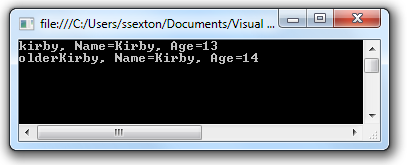#1,099 – Overloading the Increment Operator
May 19, 2014 1 Comment
You can overload the increment (++) operator in a class, providing custom increment functionality for an object.
The example below shows an overloaded increment operator defined in a Dog class. The effect is to add 1 to the age of the dog. We are careful to return a reference to the object that was passed in so that no other data in the instance changes.
public class Dog
{
// Increment a Dog
public static Dog operator ++(Dog d)
{
d.Age++;
return d;
}
public string Name { get; set; }
public int Age { get; set; }
public string Nickname { get; set; }
public Dog(string name, int age)
{
Name = name;
Age = age;
Nickname = "?";
}
public override string ToString()
{
return string.Format("{0}, Age {1}, Nickname [{2}]", Name, Age, Nickname);
}
}
We can use the operator as follows:
Dog kirby = new Dog("Kirby", 10);
kirby.Nickname = "Ball Chaser";
Console.WriteLine(kirby);
kirby++;
Console.WriteLine(kirby);


